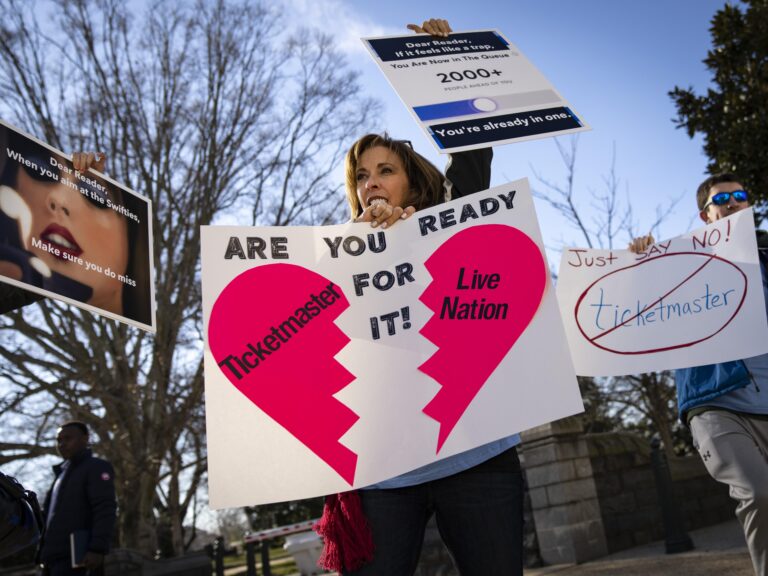The U.S. Department of Justice announced plans to file a lawsuit against Live Nation Entertainment,the parent company of Ticketmaster,accusing the ticketing giant of protecting its monopoly in the live event industry. The forthcoming legal action, revealed in 2024, alleges that Live Nation has engaged in anti-competitive practices that stifle competition and harm consumers. This case marks a significant escalation in federal scrutiny over the dominance of Ticketmaster, which has long controlled a large share of the market for concert and event tickets, raising fresh questions about fairness and access in the live entertainment sector.
U.S. Government Targets Ticketmaster Parent in Antitrust Lawsuit
The U.S. Department of Justice has announced its intent to file an antitrust lawsuit against Live Nation Entertainment, the parent company of Ticketmaster, accusing the firm of using its dominant market position to stifle competition in the live event ticketing industry. The government alleges that Live Nation’s integrated control over both concert promotion and ticket sales has allowed it to impose unfair fees and limit consumer choices, which could ultimately inflate ticket prices. This move marks a significant escalation in federal scrutiny of monopolistic practices within the entertainment and venue management sectors.
Among the key allegations highlighted by the DOJ are:
- Exclusive contracts that restrict venues from partnering with rival ticketing platforms.
- Manipulation of ticket fees that lack transparency and disproportionately burden consumers.
- Suppression of innovation by limiting access to resale markets and third-party services.
| Allegation | Potential Impact |
|---|---|
| Exclusive Venue Agreements | Decreases competition, limits venue choice |
| Fee Manipulation | Increases consumer costs |
| Resale Market Restrictions | Reduces market access for sellers and buyers |
Allegations Focus on Monopoly Practices and Consumer Harm
Federal authorities have sharpened their focus on Ticketmaster’s parent company, alleging that its dominance in the live event ticketing market stifles competition and inflicts harm on consumers. The lawsuit contends that the company’s practices, including exclusive agreements with major venues and restrictions on third-party sellers, have created a de facto monopoly. This, officials argue, leads to inflated ticket prices, reduced choice, and diminished transparency for millions of concertgoers and sports fans nationwide.
Key concerns outlined in the lawsuit include:
- Exclusive contracts limiting venue options for option ticket sellers.
- High service fees that have steadily increased over the past decade.
- Manipulative pricing algorithms designed to maximize profits at the expense of customers.
| Impact Area | Consumer Effect | Alleged Practice |
|---|---|---|
| Ticket Pricing | Prices 25%-40% above market average | Price gouging via dynamic pricing |
| Market Access | Limited seller competition | Exclusive venue deals |
| Transparency | Confusing fee structures | Hidden service charges |
Industry Experts Weigh Impact on Live Event Ticket Sales
Industry analysts emphasize that the impending lawsuit against Ticketmaster’s parent company could significantly reshape the live event landscape. Market veterans argue that the current monopoly has led to inflated ticket prices and limited consumer choices, stifling competition and innovation.Experts predict a potential rise in diversified ticket-selling platforms as legal pressures mount, encouraging new entrants to disrupt the longstanding dominance. Though, some caution that transitional chaos may cause short-term disruption for concertgoers, from confusing ticket flows to pricing volatility.
- Market Analyst Jane Rivers: “A breakup or forced changes to Ticketmaster’s business model could democratize access and reduce fees.”
- Concert Promoter Mike Sloan: “While improvements are needed, sudden shifts risk alienating fans used to a reliable system.”
- Tech Consultant Leo Zhang: “This could accelerate innovation in blockchain ticketing and fan-to-fan resale markets.”
| Impact Area | Potential Outcome |
|---|---|
| Ticket Prices | Possible Decrease Over Time |
| System Reliability | Short-term Fluctuations |
| Market Competition | Increase with New Entrants |
Calls for Increased Regulation and Market Competition Strategies
The lawsuit against Ticketmaster’s parent company ignites a broader debate regarding the urgent need to reform the ticketing industry.Experts and consumer advocates argue the dominance of a single entity has stifled competition, leading to inflated prices and limited choices for concertgoers nationwide. Lawmakers are pushing for legislative measures that not only prevent monopolistic practices but also open the door for innovative market entrants.
Proposed strategies to restore balance include:
- Implementing stricter antitrust regulations to prevent vertical integration that advantage one platform over others.
- Mandating transparency in service fees and pricing models to empower consumers with clearer facts.
- Encouraging decentralized ticket distribution channels to diversify market options and reduce reliance on dominant players.
| Strategy | Impact | Current Status |
|---|---|---|
| Antitrust Enforcement | Prevents consolidation and abuse of market power | Under active review |
| Fee Transparency | Enhances consumer trust and market fairness | Proposed legislation |
| Diversified Platforms | Increases competition and innovation | Early-stage pilot programs |
Closing Remarks
As the U.S.government prepares to take legal action against Ticketmaster’s parent company, the unfolding case promises to be a pivotal moment in the ongoing scrutiny of monopolistic practices within the live entertainment industry. With allegations that the company has actively defended its dominant market position to the detriment of competition and consumers, the lawsuit could reshape how ticket sales are regulated and challenge the power dynamics governing major events. Stakeholders across the sector will be closely watching as the case advances, potentially setting new precedents for antitrust enforcement in the digital era.




